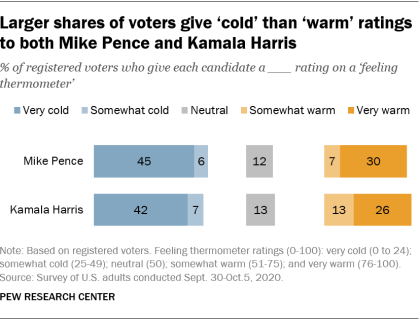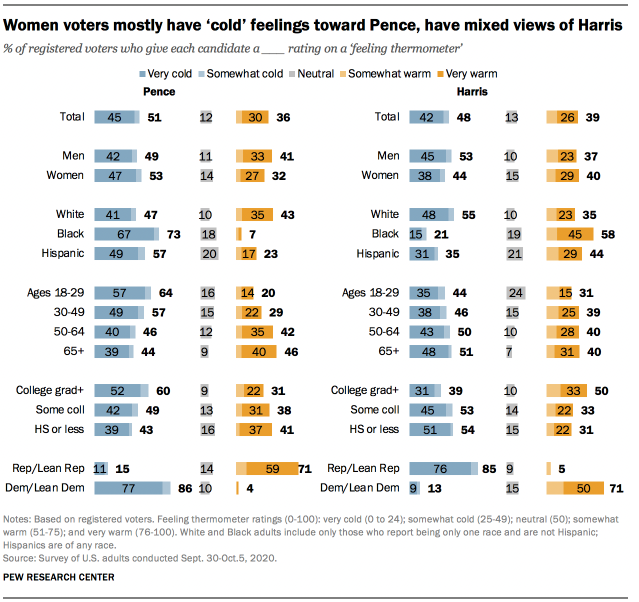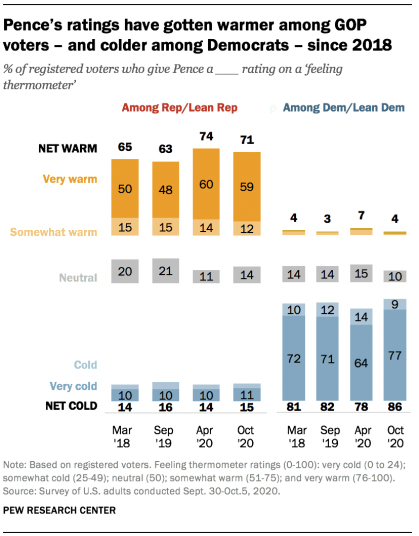
As they prepare to meet in a vice-presidential debate on Oct. 7, both Republican Mike Pence and Democrat Kamala Harris elicit more negative than positive feelings from registered voters, according to a new Pew Research Center survey.

Around half of registered voters (51%) give Pence “cold” ratings, while slightly more than a third (36%) give him “warm” ratings and 12% have neutral feelings.
For Harris, 48% express cold feelings, 39% have warm feelings and 13% give her neutral ratings, according to the Sept. 30-Oct. 5 survey of 11,929 adults, including 10,543 registered voters.
Pew Research Center conducted this study to understand U.S. registered voters’ views of the two major parties’ vice presidential candidates, Mike Pence and Kamala Harris. For this analysis, we conducted a survey of 11,929 U.S. adults (including 10,543 registered voters) between Sept. 30 and Oct. 5, 2020.
Everyone who took part is a member of the Center’s American Trends Panel (ATP), an online survey panel that is recruited through national, random sampling of residential addresses. This way nearly all U.S. adults have a chance of selection. The survey is weighted to be representative of the U.S. adult population by gender, race, ethnicity, partisan affiliation, education and other categories. Read more about the ATP’s methodology. Here are the questions used for this report, along with responses, and its methodology.
The results are based on a “feeling thermometer” in which 100 represents the warmest, most positive score and 0 represents the coldest, most negative rating. Ratings above 50 are considered warm, ratings below 50 are considered cold and ratings of 50 are neutral.
Both candidates draw higher cold ratings among voters in the opposing party than warm ratings among members of their own party. About seven-in-ten Republican and Republican-leaning registered voters (71%) have warm feelings for Pence, while an even larger share of GOP voters (85%) give cold ratings to Harris.
Harris’s ratings among partisans are nearly the mirror image of Pence’s. While 71% of Democratic and Democratic leaning voters give Harris warm ratings, 86% feel coldly toward Pence.
There also are sizable gender and race differences in views of both candidates. More than half of women voters (53%) give cold ratings to Pence, while just 32% give him warm ratings. Women voters have mixed views of Harris (44% cold, 40% warm). About half of men voters give cold ratings to both candidates (49% Pence, 53% Harris), while fewer view each warmly.

Black voters have largely positive opinions of Harris. Nearly six-in-ten (58%) give her warm ratings, more than twice the share (21%) who feel cold toward her. Most Black voters (73%) feel coldly toward Pence, including 67% who give him very cold ratings – that is, 0 to 24 on the feeling thermometer.

White voters are more negative than positive toward Harris (55% cold, 35% warm), and they have mixed views of Pence (47% cold, 43% warm).
Over the past two years, Pence’s ratings have become more divided along partisan lines. Currently, 71% of Republican voters give Pence a warm rating, including 59% who have very warm feelings toward him (ratings of 76 to 100). In March 2018, 65% viewed Pence warmly, with 50% saying they had very warm feelings.
During this period, the share of Democrats who give Pence very cold ratings has increased from 72% to 77%.
Note: Here are the questions used for this report, along with responses, and its methodology.
CORRECTION (October 2020): The methodology section has been updated to reflect the correct cumulative response rate. None of the study findings or conclusions were affected.

